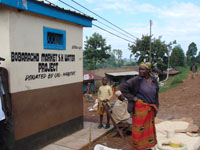Water-sector reforms and interventions in urban Kenya: their Impact on the livelihoods of the poor
 The Kenyan government’s long-term objective is to ensure that all Kenyans, especially the poor, have access to clean water and that water is available for key economic activities. The water-sector reforms currently being implemented in Kenya under the Water Act 2002 are designed to contribute to the realization of this objective as well as to addressing the policy, regulations and service-provision weaknesses in the previous Water Act Cap 372. This research project has two main objectives, namely to describe and analyze the nature, extent and impact of water-sector reforms and interventions at the municipality level, and to assess the impact of these reforms on the livelihood of low-income urban households. These objectives will be achieved through household surveys, water-quality analysis, (in-depth) interviews and case studies in Kisumu, Homa Bay and Kisii.
The Kenyan government’s long-term objective is to ensure that all Kenyans, especially the poor, have access to clean water and that water is available for key economic activities. The water-sector reforms currently being implemented in Kenya under the Water Act 2002 are designed to contribute to the realization of this objective as well as to addressing the policy, regulations and service-provision weaknesses in the previous Water Act Cap 372. This research project has two main objectives, namely to describe and analyze the nature, extent and impact of water-sector reforms and interventions at the municipality level, and to assess the impact of these reforms on the livelihood of low-income urban households. These objectives will be achieved through household surveys, water-quality analysis, (in-depth) interviews and case studies in Kisumu, Homa Bay and Kisii.
Senior researchers
External affiliates
Geographic
Keywords
Funding and cooperation
ASC

